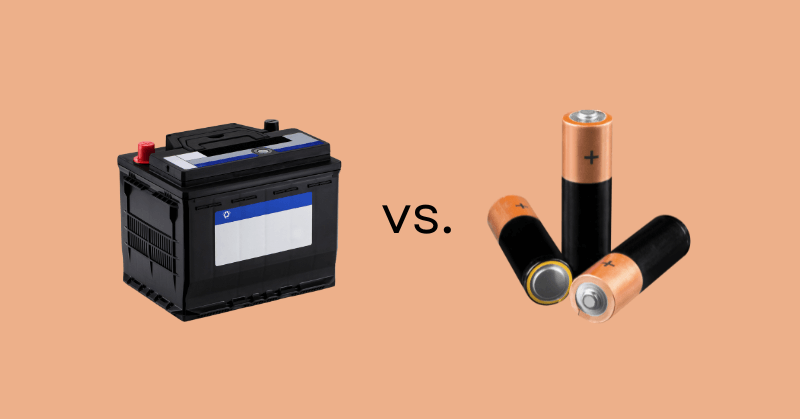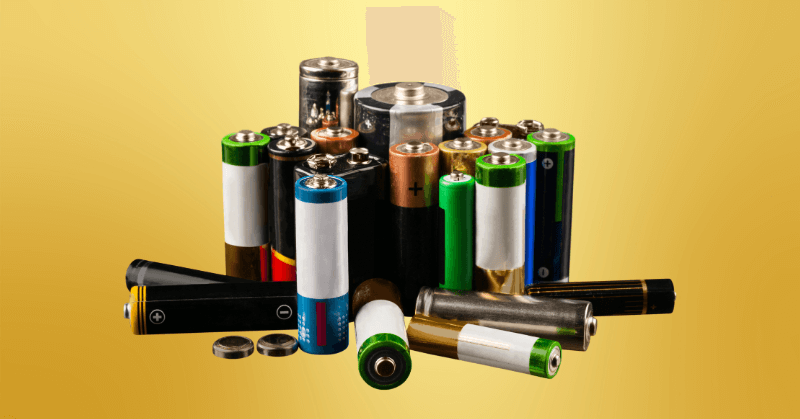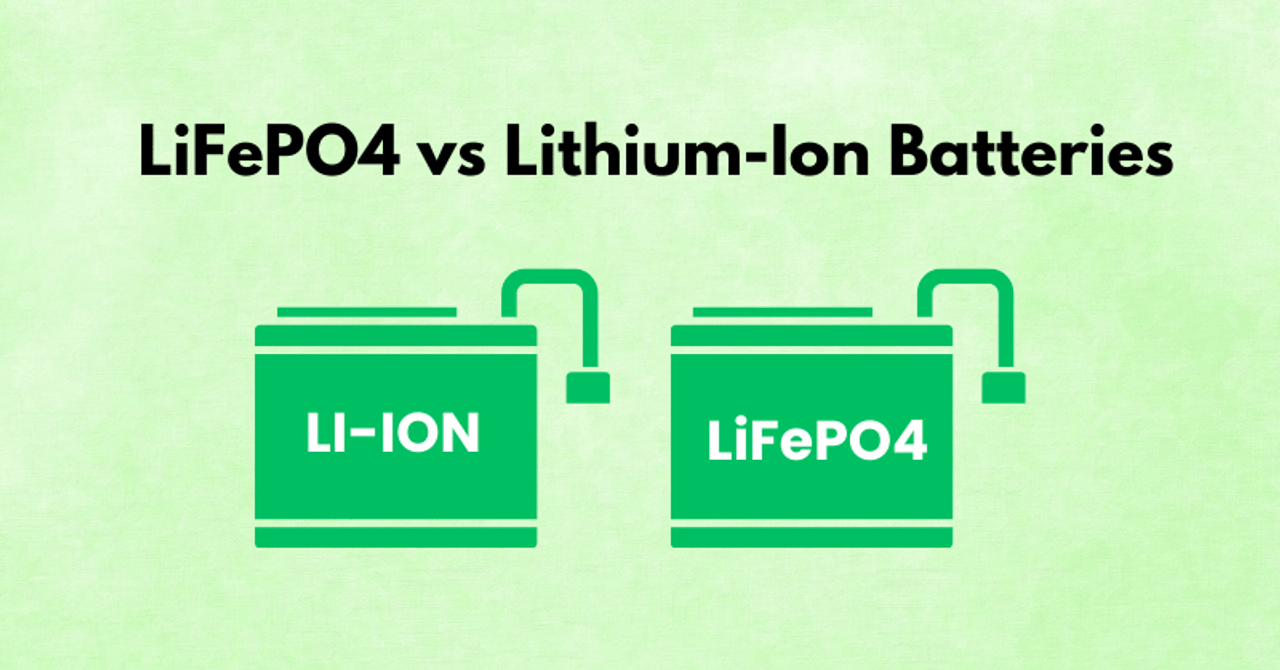Lifepo4 Vs Lithium Ion Batteries: What Makes Them Different from Each Other?
As you know, the market has a wide range of batteries available for different purposes. Each product comes with a different energy storage capacity, lifespan, warranty, and price. Considering all these parameters, it is crucial to know which battery suits your requirements the best. For this, you must look at what type of appliances you want to power up with the battery.
Once you are familiar with the right battery type, you will be able to get the most out of it. This article specifically focuses on two battery types: lithium-ion and lithium iron phosphate. It presents a detailed discussion on LiFePO4 vs lithium ion batteries.
Read more to get familiar with which battery is right for you. In addition, this read presents a brief comparison between lithium and non-lithium batteries. Let's get into deeper specifics.
LiFePO4 vs lithium ion batteries: What are the prominent differences?
When we compare lithium iron phosphate vs lithium ion batteries, we can see that both are rechargeable and can be used multiple times by charging them every time they get discharged.
On the other hand, they are different from each other in terms of safety, lifespan, temperature range, chemical composition, energy density, weight, and voltage. Let's look at how each parameter makes them different from each other.
1. Safety
A lithium iron phosphate battery is safer than a lithium-ion battery. The reason behind this fact is that LiFePO4 batteries are less prone to exploding and overheating.
Though lithium ion batteries come with extended safety when installed and used properly, they are still prone to fire catching and overheating (when they are not installed correctly or are damaged).
Therefore, lithium iron phosphate batteries are recommended for applications where there is a need for extra safety, such as industrial applications.
2. Lifespan
The lifespan of LiFePO4 batteries is longer than a Li-ion battery. A lithium iron phosphate battery can last for over 10 years, even with daily use. On the other hand, the average lifespan of a lithium-ion battery is between 2 and 5 years. But, advanced Li-ion batteries can last for up to 10 years, but this is not the case with every unit.
Similarly, a LiFePO4 battery comes with more than 4,000 charge cycles, whereas a Li-ion battery supports between 2,000 and 3,000 charge cycles. Generally, the materials used during the battery's construction affect the lifespan. But remember, the usage pattern also has a direct impact on the life cycle of a battery.
3. Temperature range
The temperature range at which LiFePO4 batteries can work perfectly is between -20 degrees Celsius and 60 degrees Celsius. In comparison, 0 degrees Celsius to 45 degrees Celsius is the optimal temperature range for lithium-ion batteries. This means that lithium iron phosphate batteries have a wider temperature range than lithium ion batteries.
LiFePO4 batteries can operate better in colder and hotter environments (without any performance degradation) than Li-ion batteries. Therefore, lithium iron phosphate batteries are the ideal choice for applications where stable battery performance is required in extreme temperatures, e.g., marine applications.
4. Chemical composition
As the name and formula depict, lithium iron phosphate batteries are made up of phosphate, iron, and lithium ions. This composition makes a LiFePO4 battery more stable, reliable, long-lasting, and safer than all other conventional batteries.
In comparison, Li-ion batteries are made up of composite cathode materials (manganese, nickel, and cobalt) and metallic lithium. This composition makes lithium-ion batteries more efficient and energy-dense.
5. Energy density
The term “energy density” refers to how much energy a battery can store within its structure. The energy density of LiFePO4 batteries is lower than Li-ion batteries. However, lithium iron phosphate batteries are safer and long-lasting.
LiFePO4 batteries are recommended for specific applications where extended life and safety are necessary, e.g., backup power storage. On the other hand, lithium-ion batteries are more commonly used in electric vehicles and consumer electronics. This is because of their higher energy density.
6. Weight
The capacity and size of the battery determines its weight. In terms of weight, lithium ion batteries are lighter than lithium iron phosphate batteries. If you prefer safety over weight and size, it is better to buy a LiFePO4 battery. If you need a lighter option, go for a lithium-ion battery.
7. Voltage
Traditional lithium-ion batteries offer higher voltage than lithium iron phosphate batteries. You may see it as a disadvantage of a LiFePO4 battery because it offers lower voltage, but it means that it lasts longer than a Li-ion battery. This is due to the slow discharge rate.
In comparison, lithium-ion batteries come with a rapid energy discharge rate, which is why they don't last as long as LiFePO4 batteries.

Note: If you are searching for a trusted collection of lithium iron phosphate batteries, don't forget to visit the Renogy website.
LiFePO4 vs lithium-ion: Which battery is right for you?
If you want to ensure effective and reliable energy storage, it is important to choose the right battery for your solar energy system. When it comes to selecting a good battery, a couple of factors should be considered, as listed and briefed below.
- Battery type: Considering the type of the battery is most important when making a worthy battery choice. Some are bigger in size but last longer, such as LiFePO4 batteries. On the other hand, some batteries come with high energy density and high voltage, such as lithium-ion batteries.
- Safety: Batteries are prone to overheating and fire hazards; therefore, considering their safety is another important thing. A good battery comes with potential safety features, including overcharge prevention, thermal management, and short-circuit protection.
- Life cycle: Since batteries are expensive, you will always want to see the lifespan when choosing one. A good battery comes with a warranty and a lifespan of several years with no notable performance degradation. It is always recommended to invest in a battery with a longer life cycle to ensure peace of mind.
- Capacity: The capacity of a battery means the amount of energy it can store within its case. The higher the capacity, the better the battery will be. Before you choose a specific battery, don't forget to assess your energy requirements. Then, select the battery that can provide you with enough power to fulfill your energy needs.
Which one to choose? LiFePO4 or Li-Ion battery?
Well, it all depends on your requirements. If you are looking for a safer option, you should prefer a LiFePO4 battery over a Li-ion battery. If your requirements demand high voltage, a lithium-ion battery should be preferred over a lithium iron phosphate battery.
Similarly, if you need a battery with a longer lifespan, install a LiFePO4 battery, as it lasts longer than a Li-ion battery. If your system requires a battery with a high energy density, configure none other than a lithium-ion battery.
If your system has no issues with space, sizing, and cost, installing a lithium iron phosphate battery will be worth it for sure. On the other hand, if you are looking for a portable and cost-effective energy storage solution, a Li-ion battery will be a suitable option, as they are lightweight and affordable compared to their counterparts.
Lithium-ion batteries are preferred for home solar electric systems, as they come with a decent lifespan, decent energy capacity, high voltage, competitive price, and high energy density.
In comparison, LiFePO4 batteries are recommended for industrial and other bigger applications where there are no budgeting issues and extended safety is necessary. This is how, considering your requirements, you can choose the right battery for your system.
Do you want to explore a wide collection of long-lasting, efficient, and cost-effective battery solutions? Visit the Renogy official site, where you will find an unmatched collection of advanced batteries, including a 12V 200Ah Pro Smart Lithium Iron Phosphate battery (it comes with a self-heating function).
Are lithium batteries better than the non-lithium alternatives?
Now that you have gone through a comprehensive discussion on LiFePO4 vs Li-ion battery. It is time to compare lithium batteries with non-lithium batteries (such as AGM batteries, gel batteries, and lead acid batteries) to understand the potential of both categories. The discussion below will help you understand the clear difference between a lithium and a non-lithium battery.
1. AGM battery
It is among the new battery types. An AGM battery has replaced gel and lead acid batteries in many applications. Though it is a new technology but when you compare it with a lithium battery, you will see a clear difference in the overall performance. Lithium batteries are more efficient than AGM batteries.
Lithium batteries discharge at a slower rate, and their lifespan is usually 6 times longer than AGM batteries. Considering these things, you should prefer a lithium battery over an AGM battery.
2. Gel battery
This battery type is basically an improved version of a lead-acid battery. A gel battery does not need electrolyte top-up, and it comes with a sealed construction.
When you compare the performance of a gel battery with a lithium battery, there is a huge difference. The overall performance of a lithium battery is far better than that of a gel battery.
Moreover, a gel battery should be placed in a compartment with proper ventilation. This is not the requirement for a lithium battery.
3. Lead acid battery
This type of battery is mainly used with Uninterrupted Power Supply (UPS) and other similar applications. In comparison, lithium batteries are preferred for applications such as electric vehicles, solar power backup solutions, and more.
It is a fact that a lead acid battery is cheaper than a lithium battery. Remember, a lithium battery can last 10 times longer than a lead acid battery, which is a huge plus point and a major reason behind its popularity.
Moreover, constant maintenance is required for lead acid batteries, e.g., terminal maintenance and electrolyte filling. On the other hand, lithium batteries need little to no maintenance. This is something that makes a lithium battery stand out in today's competitive market.

Note: Reading through this section of the article, you can clearly conclude that lithium batteries are far better than non-lithium batteries in every aspect, such as lifespan, energy density, capacity, and more.
Frequently Asked Questions (FAQs)
Is LiFePO4 better than lithium-ion?
Well, both batteries offer amazing features. However, LiFePO4 batteries are better than Li-ion batteries in terms of safety and life cycle. Lithium iron phosphate batteries are safer and last longer than their counterparts, but when it comes to the product's price, size, and voltage, lithium-ion batteries have the edge over LiFePO4 batteries. If safety and longevity are your top priority, choose a lithium iron phosphate battery over a Li-ion battery.
What are the disadvantages of LiFePO4?
A couple of drawbacks are associated with lithium iron phosphate batteries, out of which lower energy density is the biggest. The bigger size is another limitation. Similarly, the higher price is also a big barrier that stops many people from purchasing a LiFePO4 battery due to their tight budgets. Furthermore, the slow charging speed and limited energy density are two more disadvantages of lithium iron phosphate batteries.
Which type of lithium battery is best?
Out of all lithium batteries, LiFePO4 batteries are considered the best. The reason behind this fact is that they come with an extended safety feature, which is why they do not overheat and never catch fire, even if you puncture them. This is a huge advancement in the battery industry.
Is a lithium ion battery the same as a lithium iron battery?
No, they both are not the same. They are two different battery types that come with different energy densities, different energy storage capacities, different lifespans, different safety features, and different efficiencies. LiFePO4 is an advanced version of Li-ion batteries that is safer and lasts longer.
Final thoughts
Many people search for discussion on LiFePO4 vs lithium ion batteries. You must be one of them, which is why you have landed on this guide. Well, the comparison of both batteries shows that Li-ion batteries offer high energy density, high voltage, and a lightweight structure, but LiFePO4 batteries are long-lasting and more safe.
If we talk about the differences between both batteries, they differ in chemical compositions, life cycles, temperature range, safety, weight, voltage, and capacity. You need to consider all these factors as well as your energy requirements when choosing a perfect battery for your solar power system.
Similarly, upon comparing lithium batteries with non-lithium batteries, you will find a huge difference in their performance. A lithium battery is way better than installing a non-lithium battery in your system or wherever you want to use it. Though non-lithium batteries are cheaper, lithium batteries last longer and are more efficient.











